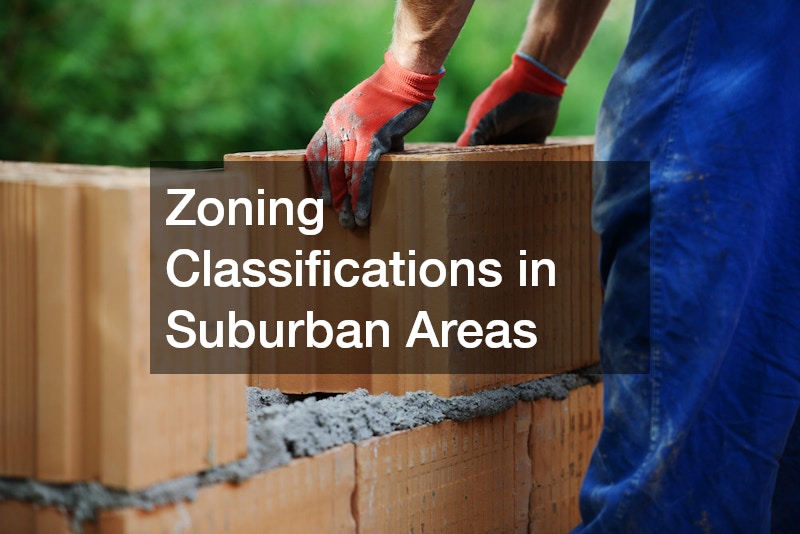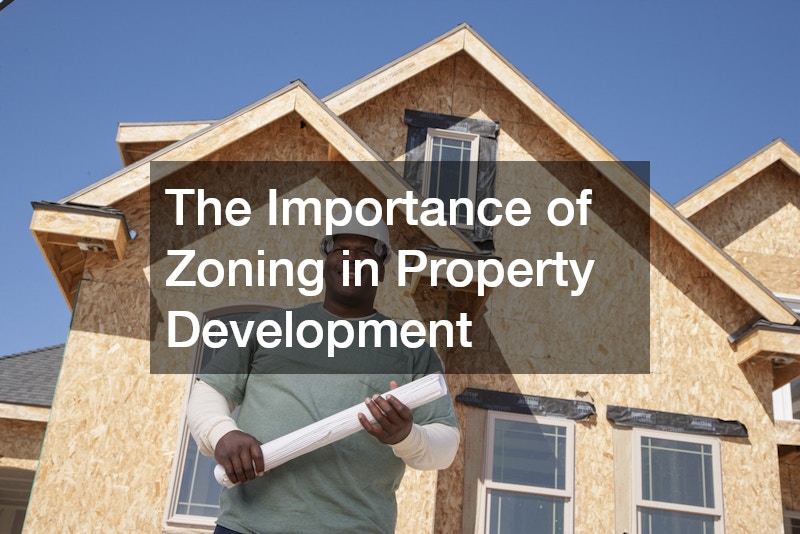Zoning classifications are critical in determining how land can be used in different areas. Local governments use zoning laws to ensure that properties are used in a way that is compatible with the surrounding area. Zoning laws are typically divided into residential, commercial, industrial, and agricultural categories. Each category outlines how the land can be utilized, and different classifications exist within these broad categories. For example, commercial zoning classifications determine how businesses can operate within a certain area, while residential zoning classifications focus on housing and related needs. This article will delve into the differences between residential and commercial zoning classifications, examining how each affects land use, businesses, and property owners.
The Basics of Residential Zoning
Residential zoning classifications are intended to regulate areas primarily for housing. These zones are created to maintain the integrity of neighborhoods and ensure that land is used for its intended residential purposes. Residential zoning classifications can include areas for single-family homes, multi-family buildings, and sometimes mixed-use developments that may include some commercial spaces like small shops or offices. The primary purpose is to maintain a quiet, family-friendly environment that is conducive to living.
For example, in residential zones, you will often find services like residential oil deliveries or tree removal services that cater specifically to homeowners’ needs. There are often restrictions on the types of businesses that can operate within these zones. In most cases, only home-based businesses with minimal impact on the neighborhood are allowed. For instance, a concrete contractor working on residential projects may be permitted to operate from their home, but a business that brings in large equipment rentals or uses dump trailers for major construction projects would not fit into residential zoning areas.

The Basics of Commercial Zoning
In contrast, commercial zoning classifications allow for the use of land for business activities. These zoning areas are meant to accommodate businesses such as retail stores, restaurants, offices, and various types of service-oriented operations. Commercial zoning classifications can be broad, and they often come with additional subcategories that define the scale and type of commercial activity allowed. For instance, commercial construction operations or large-scale commercial paving may be allowed in commercial zones but would likely be restricted or forbidden in residential zones due to noise, traffic, and other impacts.
In commercial zones, you may find businesses like metal suppliers, equipment rental companies, and services that rely on large-scale infrastructure such as propane systems or water extraction. For example, a commercial zoning classification might allow a business dealing with propane systems, which would require specialized equipment and storage space. The area would need to support the safe installation and distribution of propane, which typically cannot be done in residential areas. Likewise, services such as a dump trailer rental business or a tree removal service that caters to commercial clients may also fall within the scope of commercial zoning classifications.
Key Differences Between Residential and Commercial Zoning
There are several key differences between residential and commercial zoning classifications. The most significant differences are in the types of activities allowed, the scale of those activities, and the intended purpose of the zoning.
-
Land Use: Residential zones are focused on housing and supporting services for individuals and families, such as schools, parks, and residential oil deliveries. Commercial zones, on the other hand, are designed to support businesses that require more significant infrastructure, such as parking lots, warehouses, and loading docks.
-
Scale of Operations: Commercial zoning classifications allow businesses that typically involve larger-scale operations. For example, a concrete contractor working on commercial construction projects would likely need a commercial zoning area to accommodate heavy machinery, equipment rental services, and bulk materials. Similarly, large-scale commercial paving projects often require extensive space for storage and operations, which would not be feasible in a residential zone.
-
Impact on the Environment: In residential zones, the focus is on minimizing the impact of business activity on the surrounding neighborhood. As such, residential oil deliveries are limited in scale, and tree removal services are typically designed to be minimally disruptive. In commercial zones, the level of activity is much higher, and these areas are built to handle the potential impacts of business operations, including noise, traffic, and heavy machinery.
-
Building Codes and Regulations: The regulations governing buildings in residential zones are more focused on ensuring that homes are safe and comfortable. In commercial zones, the codes are more focused on ensuring that businesses meet safety and operational requirements, such as fire codes, zoning restrictions, and equipment safety standards. For example, a business dealing with propane systems would be subject to stricter safety regulations in a commercial zone than in a residential area, where such businesses might pose a risk to homeowners.
The Importance of Zoning in Property Development
Zoning plays a crucial role in the development of land, especially when considering the long-term effects on property values and surrounding areas. Residential zoning classifications are designed to preserve the quality of life in residential neighborhoods by preventing incompatible commercial activities. However, this doesn’t mean that commercial enterprises cannot exist near residential areas; rather, they are typically located in commercial zones where their impact can be managed.
For example, equipment rental businesses are more likely to be found in commercial zones because they often require space for heavy machinery and vehicles. Similarly, businesses that need specialized services such as water extraction or the use of dump trailers would likely fall under commercial zoning classifications. These types of businesses generally do not belong in residential neighborhoods due to the potential disruptions they could cause. Additionally, if a tree removal service were to operate in a residential area, it might interfere with the quiet and peaceful nature of the neighborhood, which would be a concern for zoning regulations.
Mixed-Use Zoning and Its Flexibility
Some areas have mixed-use zoning, which blends residential and commercial zoning classifications to allow both types of land use within the same area. Mixed-use zones can support a combination of residential housing and commercial businesses, such as small shops, offices, and even some service industries. This flexibility allows for more vibrant communities where people can live, work, and access essential services in close proximity.
In mixed-use zones, there may be opportunities for businesses like propane systems suppliers, tree removal services, or metal suppliers to operate alongside residential homes. However, even in these areas, commercial activities are often regulated to ensure that they do not disrupt the residential nature of the neighborhood. For example, a concrete contractor who specializes in residential and commercial construction projects may be allowed to operate in a mixed-use zone but would need to adhere to certain restrictions related to noise, traffic, and hours of operation.
Commercial Zoning Classifications in Urban Areas
In urban areas, commercial zoning classifications are essential for managing the dense population and ensuring that businesses can function in a manner that is compatible with the environment. Urban commercial zones often support a wide variety of businesses, from retail stores and restaurants to large-scale commercial construction companies. These zones are designed to accommodate businesses that require significant infrastructure, such as large parking lots, equipment rental services, and facilities for managing heavy equipment or hazardous materials like propane systems.
Urban commercial zones may also support services that cater to industrial clients, such as metal suppliers, which provide raw materials to local manufacturers or construction projects. These areas are more likely to support commercial paving companies, concrete contractors, and other service-based businesses that are essential to the infrastructure of urban life. However, even in commercial zones, zoning laws aim to balance the needs of businesses with the quality of life for those living in the area, often regulating business hours, noise levels, and other factors.

Zoning Classifications in Suburban Areas
Suburban areas typically feature a mix of residential and commercial zones, with residential neighborhoods being separated from commercial zones to maintain a peaceful living environment. In suburban commercial zones, businesses like equipment rental companies, tree removal services, and even commercial paving businesses are more likely to thrive due to the availability of space and the infrastructure needed to support such operations. However, suburban zoning regulations often impose strict limits on the scale of commercial activities to prevent overcrowding or disruption to the residential areas.
In suburban commercial zones, you might find services that support residential homeowners, such as water extraction companies and residential oil deliveries, operating alongside more substantial businesses that serve a broader market. Suburban commercial zoning often strikes a balance between accommodating business needs and preserving the character of residential neighborhoods, which is why many suburban areas contain well-regulated mixed-use zones where both types of businesses can coexist in harmony.
Zoning Variances and Special Exceptions
In some cases, property owners may seek zoning variances or special exceptions if they wish to use land in a way that doesn’t strictly conform to the existing zoning classification. Zoning variances allow for some flexibility in how a property can be used, but these requests must be made through a formal process with the local zoning board or governing body. The process involves applying for a change in zoning regulations and demonstrating that the proposed use will not negatively affect the surrounding area.
For example, a business that typically operates under commercial zoning classifications, such as an equipment rental service, may request a variance to operate in a residential area, but they would need to show that their operations would not create excessive noise, traffic, or other disturbances. Similarly, if a propane systems business wanted to set up shop near a residential zone, they might apply for a special exception to accommodate their needs. However, zoning boards often require thorough documentation and assessments, including environmental impacts, safety concerns, and the overall benefit to the community. Zoning variances are typically granted only when the applicant can prove that the new use aligns with the public interest and will not undermine the goals of the original zoning laws.
The Future of Zoning: Mixed-Use Developments and Sustainability
As cities continue to grow and urbanization accelerates, zoning laws are evolving to reflect new trends in land use and urban planning. Mixed-use developments, which combine residential and commercial zoning classifications within the same area, have become increasingly popular in many cities. These developments create vibrant neighborhoods where residents can live, work, and access services without traveling far. In some cases, these mixed-use zones might include businesses like tree removal services, equipment rental companies, or even residential oil deliveries, while still preserving the residential character of the area.
Moreover, sustainability has become a key consideration in the development of zoning regulations. Green buildings, sustainable construction practices, and environmentally friendly transportation options are gaining traction in both residential and commercial zoning classifications. A concrete contractor working in commercial construction, for instance, may now be required to follow new guidelines that incorporate eco-friendly materials or energy-efficient systems into their projects. Additionally, businesses involved in landscaping, like tree removal services, may be encouraged to adopt sustainable practices, such as using biodegradable products or recycling materials, which is increasingly being mandated by zoning laws in many areas. This trend reflects the growing need to balance development with environmental stewardship as communities evolve to meet the challenges of the 21st century.

Conclusion: The Importance of Zoning Classifications
Understanding the distinctions between residential and commercial zoning classifications is vital for property owners, developers, and business owners. Residential zoning classifications protect neighborhoods by limiting the types of businesses and activities that can operate within these areas. On the other hand, commercial zoning classifications provide the necessary space and infrastructure for businesses that contribute to the local economy, from commercial construction projects to equipment rental services and specialized industries such as propane systems or metal suppliers.
For businesses such as tree removal services, concrete contractors, and commercial paving companies, understanding the rules of commercial zoning classifications is crucial to ensure compliance and avoid penalties. Similarly, property owners and developers must understand the zoning laws in their area to make informed decisions about land use, whether they are looking to build a new home, start a business, or invest in a commercial property. By recognizing the importance of zoning, we can create more organized, efficient, and livable communities that support both residential and commercial needs.

